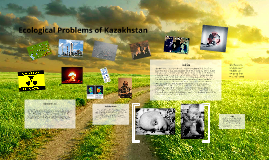
Ecological Problem In Kazakhstan Topic
Essay ecological problems in kazakhstan ppt. Posted on October 29, 2018. The problem of ecology essay topic.
Since ancient times Nature has served Man, being the source of his life. For thousands of years people lived in harmony with environment and it seemed to them that natural riches were unlimited. But with the development of civilization man's interference in nature began to increase. Large cities with thousands of smoky industrial enterprises appear all over the world today. The by-products of their activity pollute the air we breathe, the water we drink, the land we grow grain and vegetables on.
Every year world industry pollutes the ahmosphere with about 1000 million tons of dust and other harmful substances. Many cities suffer from smog. Vast forests are cut and burn in fire. Their disappearance upsets the oxygen balance. As a result some rare species of animals, birds, fish and plants disappear forever, a number of rivers and lakes dry up.The pollution of air and the world's ocean, destruction of the ozone layer is the result of man's careless interaction with nature, a sign of the ecological crises.The most horrible ecological disaster befell Ukraine and its people after the Chernobyl tragedy in April 1986. About 18 percent of the territory of Byelarus were also polluted with radioactive substances.
A great damage has been done to the agriculture, forests and people's health. The consequences of this explosion at the atomic power-station are tragic for the Ukrainian, Byelarussian and other nations. Environmental protection is of a universal concern. That is why serious measures to create a system of ecological security should be taken. Some progress has been already made in this direction. As many as 159 countries - members of the UNO - have set up environmental protection agencies. Numerous conferences have been held by these agencies to discuss problems facing ecologically poor regions including the Aral Sea, the South Urals, Kuzbass, Donbass, Semipalatinsk and Chernobyl.
An international environmental research centre has been set up on Lake Baikal. The international organisation Greenpeace is also doing much to preserve the environment. Dlya portfolio semejnoe derevo. But these are only the initial steps and they must be carried onward to protect nature, to save life on the planet not only for the sake of the present but also for the future generations.
Kazakstan Environmental Problems The environment of Kazakstan has been badly damaged by human activity. Most of the water in Kazakstan is polluted by industrial effluents, pesticide and fertilizer residue, and, in some places, radioactivity. The most visible damage has been to the Aral Sea, which as recently as the 1970s was larger than any of the Great Lakes of North America save Lake Superior. The sea began to shrink rapidly when sharply increased irrigation and other demands on the only significant tributaries, the Syrdariya and the Amu Darya (the latter reaching the Aral from neighboring Uzbekistan), all but eliminated inflow. By 1993 the Aral Sea had lost an estimated 60 percent of its volume, in the process breaking into three unconnected segments. Increasing salinity and reduced habitat have killed the Aral Sea's fish, hence destroying its once-active fishing industry, and the receding shoreline has left the former port of Aral'sk more than sixty kilometers from the water's edge.
The depletion of this large body of water has increased temperature variations in the region, which in turn have had an impact on agriculture. A much greater agricultural impact, however, has come from the salt- and pesticide-laden soil that the wind is known to carry as far away as the Himalaya Mountains and the Pacific Ocean. Deposition of this heavily saline soil on nearby fields effectively sterilizes them. Evidence suggests that salts, pesticides, and residues of chemical fertilizers are also adversely affecting human life around the former Aral Sea; infant mortality in the region approaches 10 percent, compared with the 1991 national rate of 2.7 percent. By contrast, the water level of the Caspian Sea has been rising steadily since 1978 for reasons that scientists have not been able to explain fully. At the northern end of the sea, more than a million hectares of land in Atyrau Province have been flooded. Experts estimate that if current rates of increase persist, the coastal city of Atyrau, eighty-eight other population centers, and many of Kazakstan's Caspian oil fields could be submerged by 2020.